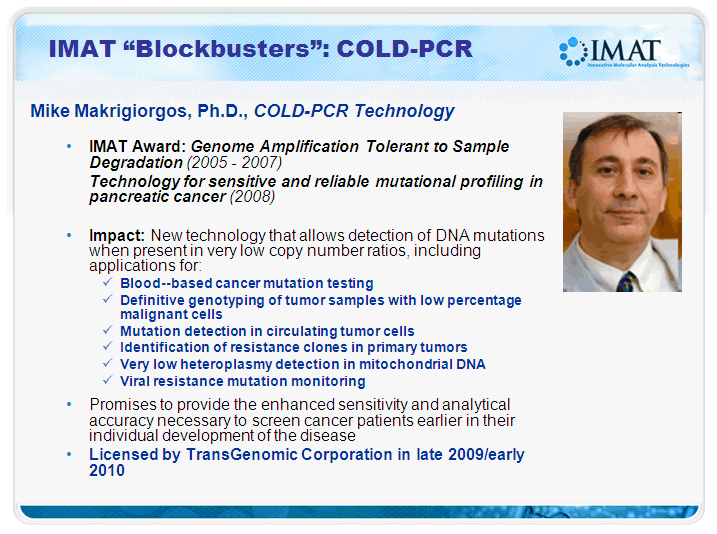| PI | Institution | IMAT Award Type |
|---|---|---|
| Mike Makrigiorgos | Dana Faber Cancer Institute | R33 |
COLD-PCR (COamplification at Lower Denaturation temperature PCR) is a new technology that allows detection of DNA mutations when present in very low copy number ratios. COLD-PCR preferentially enriches mutant DNA in a mutant/wild-type mixture by exploitation of the critical temperature, Tc, at which mutation-containing DNA is preferentially melted over wild-type.

IMAT "Blockbusters": COLD-PCR
Mike Makrigiorgos, Ph.D., COLD-PCR Technology
- IMAT Award: Genome Amplification Tolerant to Sample Degradation (2005 - 2017)
Technology for sensitive and reliable mutational profiling in pancreatic cancer (2008) - Impact: New technology that allows detection of DNA mutations when present in very low copy number rations, including applications for:
- Blood-based cancer mutation testing
- Definitive genotyping of tumor samples with low percentage malignant cells
- Mutation detection in circulating tumor cells
- Identification of resistance clones in primary tumors
- Very low heteroplasmy detection in mitochondrial DNA
- Viral resistance mutation monitoring
- Promises to provide the enhanced sensitivity and analytical accuracy necessary to screen cancer patients earlier in their individual development of the disease
- Licensed by TransGenomic Corporation in late 2009/early 2010
COLD-PCR allows detection of less than one mutant copy per 1,000 wild-type copies. The technology has multiple applications, including, but not necessarily limited to:
- Blood-based cancer mutation testing
- Definitive genotyping of tumor samples with low percentage malignant cells
- Mutation detection in circulating tumor cells
- Identification of resistance clones in primary tumors
- Very low heteroplasmy detection in mtDNA
- Viral resistance mutation monitoring
COLD-PCR promises to provide the enhanced sensitivity and analytical accuracy necessary to screen cancer patients earlier in their individual development of this disease. The technology has been licensed in late 2009/early 2010 by Transgenomic from the Dana Farber Cancer Institute with an exclusive license for Sanger sequencing applications.

